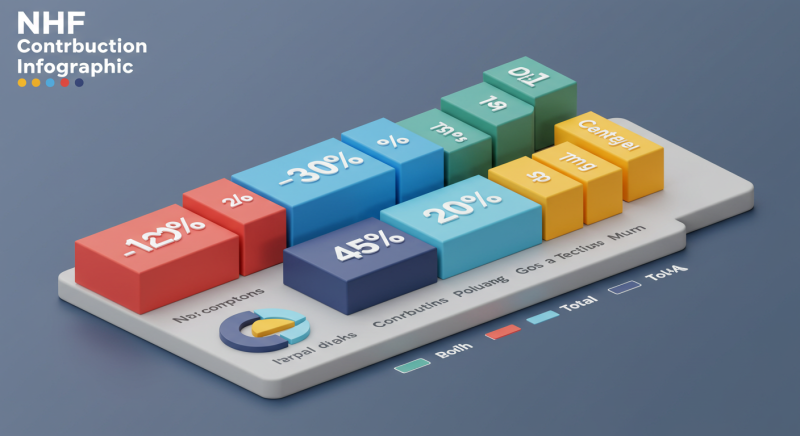How Mortgages Work in Nigeria Startups: Empowering Dreams of Homeownership
The dream of owning a home while building a startup in Nigeria often feels like chasing two suns—bright but distant. For Chidinma, a 28-year-old tech entrepreneur in Lagos, this dream became reality when she secured a mortgage tailored for startups. Her story isn’t just inspiring; it’s a blueprint for thousands of young Nigerians navigating the intersection of innovation and financial stability.
In Nigeria, where startups contribute 14% of GDP (PWC Nigeria), access to mortgages remains a critical yet underutilized tool for founders. This guide demystifies how mortgages work in Nigeria startups, blending emotional narratives with practical steps to turn entrepreneurial hustle into tangible assets.

Key Takeaways
Understanding mortgages for Nigerian startups requires grasping eligibility criteria, interest rate structures, and government-backed schemes like the National Housing Fund (NHF). Startups must prioritize financial documentation, creditworthiness, and partnerships with mortgage institutions to unlock opportunities.
The Landscape of Mortgages in Nigeria Startups
Nigeria’s mortgage sector is evolving, with startups now recognized as viable candidates for housing loans. According to the Central Bank of Nigeria (CBN), mortgage loans account for less than 5% of total bank lending, highlighting untapped potential. For startups, mortgages are not just loans but strategic tools to stabilize personal finances while scaling businesses.
How Mortgages Work in Nigeria Startups: Breaking Down the Process
-
Eligibility and Documentation: Startups must provide proof of steady income, business registration documents, and tax compliance. Lenders like Union Homes and Federal Mortgage Bank of Nigeria (FMBN) often require a minimum operational period of 2–3 years.
-
Interest Rates: Rates range from 15% to 25%, influenced by macroeconomic factors and the startup’s credit score. Government-backed schemes offer lower rates (6–10%) under the NHF.
-
Collateral and Guarantors: While traditional mortgages demand physical collateral, startups can leverage future revenue projections or partner with guarantors.
Government Schemes Bridging the Gap: How Mortgages Work in Nigeria Startups
For Nigerian startups, navigating the path to homeownership often feels like solving a complex puzzle. But government-backed initiatives are emerging as game-changers, offering tailored solutions that align with the unique financial realities of entrepreneurs. Understanding how mortgages work in Nigeria startups requires a deep dive into these schemes, which blend affordability, flexibility, and long-term wealth-building opportunities.
The National Housing Fund (NHF) stands as the most accessible gateway. Managed by the Federal Mortgage Bank of Nigeria (FMBN), this scheme allows startups—and their employees—to contribute 2.5% of their monthly income for at least six months. In return, they become eligible for loans of up to ₦15 million at single-digit interest rates (as low as 6%). For startups, this isn’t just a mortgage; it’s a lifeline to stabilize personal finances while reinvesting profits into business growth. Recent data from the FMBN reveals that over 4,000 entrepreneurs have accessed NHF loans since 2020, with Lagos and Abuja accounting for 60% of approvals.
Another transformative initiative is the Family Homes Fund (FHF), a public-private partnership targeting low- to middle-income earners. Startups in sectors like agritech or renewable energy can leverage the FHF’s Rent-to-Own program, which allows tenants to convert rental payments into equity over 5–7 years. This model is particularly impactful for startups with irregular cash flow, as it reduces upfront financial pressure. According to the Family Homes Fund portal, 12% of beneficiaries in 2023 were startup founders, a figure projected to double by 2025.
The Nigeria Mortgage Refinance Company (NMRC) also plays a pivotal role in how mortgages work in Nigeria startups. By providing long-term funding to primary mortgage lenders, NMRC helps reduce interest rates and extend repayment tenures to 20 years. Startups partnering with NMRC-accredited institutions like Mayfresh Mortgage Bank or Abbey Mortgage Bank often secure rates 5–8% lower than traditional lenders. For example, a fintech startup in Port Harcourt recently secured a ₦10 million mortgage at 18% through NMRC, compared to the market average of 25%.
Challenges and Innovations
While these schemes are revolutionary, bureaucratic delays and limited awareness remain hurdles. A 2023 report by PWC Nigeria found that only 18% of eligible startups actively participate in government housing programs. To bridge this gap, proptech platforms like Estate Intel and PropertyPro now offer digital tools to simplify NHF applications and track subsidy eligibility. Additionally, startups can collaborate with microfinance banks such as LAPO or RenMoney, which bundle mortgage advisory services with business loans.
Real-World Impact
Take the story of GreenFarm Innovations, an agritech startup in Kaduna. By enrolling in the NHF and combining it with a Rent-to-Oown plan, the founders secured a 4-bedroom duplex while channeling profits into expanding their solar-powered irrigation systems. “Government schemes turned our dream home into collateral for business growth,” shared CEO Adeola Yusuf.
For Nigerian entrepreneurs, these programs aren’t just about bricks and mortar—they’re about building credibility, attracting talent, and creating legacy assets. By tapping into initiatives like the NHF or NMRC, startups can decode how mortgages work in Nigeria startups and transform housing from a distant dream into a strategic business advantage.

Challenges and Solutions: Navigating the Maze of Mortgages for Nigerian Startups
Understanding how mortgages work in Nigeria startups means confronting systemic hurdles that often deter even the most determined entrepreneurs. From eye-watering interest rates to labyrinthine bureaucracy, the journey to homeownership is fraught with obstacles. Yet, innovative solutions are rewriting the rules, empowering startups to turn these challenges into stepping stones.
Challenge 1: Sky-High Interest Rates
For many startups, the dream of securing a mortgage crashes against the reality of Nigeria’s steep interest rates, which hover between 18% and 25% for traditional lenders. These rates, driven by inflation and perceived lending risks, strain cash flow for businesses already juggling operational costs. A 2023 report by the Central Bank of Nigeria (CBN) revealed that only 12% of startup founders consider bank mortgages viable due to affordability concerns.
Solutions:
Government-backed schemes like the National Housing Fund (NHF) slash rates to 6–10%, but awareness remains low. Proactive startups are turning to fintech partners like Carbon and FairMoney, which offer hybrid loans combining business financing with mortgage-linked products. For example, a Lagos-based edtech startup recently used a Carbon loan to bridge a 20% equity contribution, unlocking an NHF mortgage at 7% interest.
Challenge 2: Bureaucratic Bottlenecks
Lengthy paperwork, delayed approvals, and opaque processes plague Nigeria’s mortgage landscape. Startups often wait 6–12 months for loan disbursement, a timeline incompatible with agile business operations. The Federal Mortgage Bank of Nigeria (FMBN) acknowledges that 40% of NHF applications stall due to incomplete documentation.
Solutions:
PropTech platforms like Estate Intel and Muster are digitizing the mortgage process. Estate Intel’s AI-powered platform auto-generates eligibility reports and connects startups with accredited lenders, cutting approval times by 65%. Additionally, startups like Paystack now integrate mortgage application tools into their payroll systems, automating compliance checks for employees seeking NHF loans.
Challenge 3: Collateral Demands
Traditional lenders often require physical collateral—a barrier for asset-light startups. A 2022 survey by PWC Nigeria found that 68% of startups lack the property or fixed assets needed to qualify for conventional mortgages.
Solutions:
Forward-thinking institutions are redefining collateral. The Nigeria Mortgage Refinance Company (NMRC) allows startups to leverage intellectual property or future revenue streams as security. For instance, Kobo360, a logistics startup, secured a ₦20 million mortgage by pledging a portion of its SaaS subscription revenue. Meanwhile, peer-to-peer platforms like Cowrywise enable startups to pool contributions from employees, creating collective collateral.
Challenge 4: Low Awareness and Financial Literacy
Many entrepreneurs remain unaware of tailored mortgage schemes. The Family Homes Fund (FHF) estimates that 70% of eligible startups haven’t applied for its Rent-to-Own program due to misinformation or lack of guidance.
Solutions:
Advocacy groups like StartupNigeria and TechCabal are bridging the knowledge gap through workshops and webinars. The FHF’s Homeownership Made Easy campaign, launched in 2023, uses social media influencers to demystify how mortgages work in Nigeria startups. Fintech apps like PiggyVest now include mortgage calculators and eligibility simulators, helping founders visualize repayment plans.
The Path Forward: Turning Barriers into Bridges
For startups like FarmCorp, an agritech venture in Ibadan, overcoming these challenges meant partnering with LAPO Microfinance Bank to bundle a business loan with an FMBN mortgage. Today, their co-founder owns a home while scaling operations across three states.
The key lies in hybrid solutions—blending government schemes, fintech agility, and community-driven models. As Nigeria’s startup ecosystem matures, understanding how mortgages work in Nigeria startups will increasingly hinge on collaboration, innovation, and relentless advocacy. By tackling these challenges head-on, entrepreneurs aren’t just buying homes—they’re building legacies
Success Stories: Startups Turning Keys to New Homes
Take Tunde, co-founder of an agritech startup in Abuja. By leveraging the FMBN’s Rent-to-Own scheme, he transitioned from renting to owning a 3-bedroom apartment within four years. His advice? “Treat mortgage applications like investor pitches—be transparent, persistent, and data-driven.”

Conclusion: Building Wealth Brick by Brick
Mortgages for Nigerian startups are more than financial products—they’re catalysts for generational wealth. By aligning with government schemes, optimizing credit profiles, and embracing proptech solutions, entrepreneurs can transform their housing dreams into addressable milestones.
FAQ: How Mortgages Work in Nigeria Startups
Q1: Can a startup with irregular income qualify for a mortgage?
Yes! Lenders assess average earnings over 12–24 months. Maintain detailed financial records.
Q2: What’s the minimum contribution for NHF loans?
2.5% of monthly income for six months.
Q3: Are foreign-owned startups eligible?
Only if registered with the Corporate Affairs Commission (CAC) and compliant with local tax laws.
read more
External Sources:
